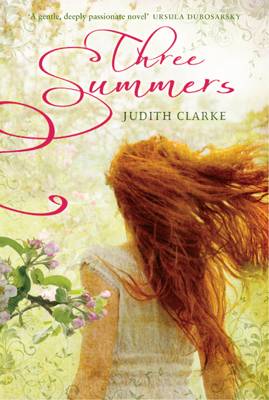Three Summers

Three Summers
The path of Ruth's life was shaped in one fateful moment when, as a baby, she was tossed clear from a car wreck. Her grandmother raised her, with a fierce hope that she would one day go to university and see every marvellous place in the world.
When Ruth and her best friend Fee finish school, Fee chooses motherhood and marriage. Ruth knows that she must leave town, but that means leaving Tam Finn, the elusive yet entrancing boy so unlike any other she has ever met.
An extraordinary story of friendship, longing and the saving grace of love.
Judith Clarke is major force in YA fiction both in Australia and internationally. Her novels include the multi-award-winning Wolf on the Fold, as well as Friend of my Heart, Night Train, Starry Nights, and the very popular and funny Al Capsella series. Kalpana's Dream was named an Honor Book in the prestigious Boston Globe/Horn Book Awards and One Whole and Perfect Day was an Honor Book in the American Library Association's prestigious Michael L. Printz Awards for Excellence in Young Adult Literature. Her most recent novel, The Winds of Heaven, was named an Honour Book in the 2010 CBCA Book of the Year awards and shortlisted for the inaugural Prime Minister's Literary Award. Judith lives in the Blue Mountains in New South Wales.
Three Summers
Allen and Unwin
Author: Judith Clarke
ISBN: 9781742378275
Price: $19.99
Interview with Judith Clarke
Question: What inspired you to write Three Summers?
Judith Clarke: The initial idea for Three Summers came from a story a friend once told me: how, as a young girl living in a country town in the nineteen fifties, she'd been denounced from the pulpit of a local church for daring to take up the scholarship she'd won to Sydney University.
But that was only the starting point. The 'real' story provided an example of something I wanted to write about: the social and family pressures on young girls growing up in an earlier era. These pressures differed greatly from those of today's society, but pressures towards conformity, towards becoming what others, whether family or peers, want or expect you to be, are still there today. Girls are no longer expected to marry young and spend their lives at home raising a family, but they are still expected, far more than boys are, to conform to what is now seen as socially and economically desirable. And romantic relationships are still perceived as the key to happiness and 'normality'.
Question: Are the characters based on anyone you know?
Judith Clarke: No. Ruth, the central character, the girl who escapes from the small town to go to university, is nothing like the friend who once told me of her similar escape, and neither is Ruth's family anything like the 'real' family. My characters are always fictional-- I might take a single observed aspect of a 'real' person's behaviour, and mix it with aspects from elsewhere, to create an imaginary character, but I'd never do a straight portrait of a real person unless I was writing biography. It's not simply that it's intrusive; it's also limiting, confining: you need to be free to 'make up' characters that fit your themes and story.
Question: How much of your inspiration comes from real life and real people?
Judith Clarke: I think most inspiration comes from what we experience in the real world, from learning to understand these experiences and to construct from this understanding our particular interpretation of the world. Inspiration also comes from reading, but that is inspiration of a different kind.
Question: What is the best thing about creating a character like Ruth?
Judith Clarke: The best thing about creating Ruth (who appears first when she's seventeen, and in the last part of the book, at sixty) was that I could show her at different stages of her life. I could reveal 'how everything turns out': how her youthful uncertainties give way to strength and independence and the ability to forge for herself an individual kind of happiness beyond the pressures of conformity. And also, of course, I wanted to show how her whole life is illumined and shadowed by her girlhood encounter with the mysterious and ultimately tragic boy, Tam Finn-- as so many peoples' lives are affected and even shaped by the people they meet, and the things that happen to them when they are young.
Question: Finish this sentence, The best thing about books is . . .
Judith Clarke: 'When you've finished them,' as a boy said to me once at a children's literature festival.
Seriously though, I find it hard to answer questions like this (complete the sentence): they remind me of IQ tests and other unsettling experiences from my schooldays. They bring on(as they did back then) an immediate paralysis of the mind-so that I have to push the question away, lie down and read a good book in order to recover.
MORE





